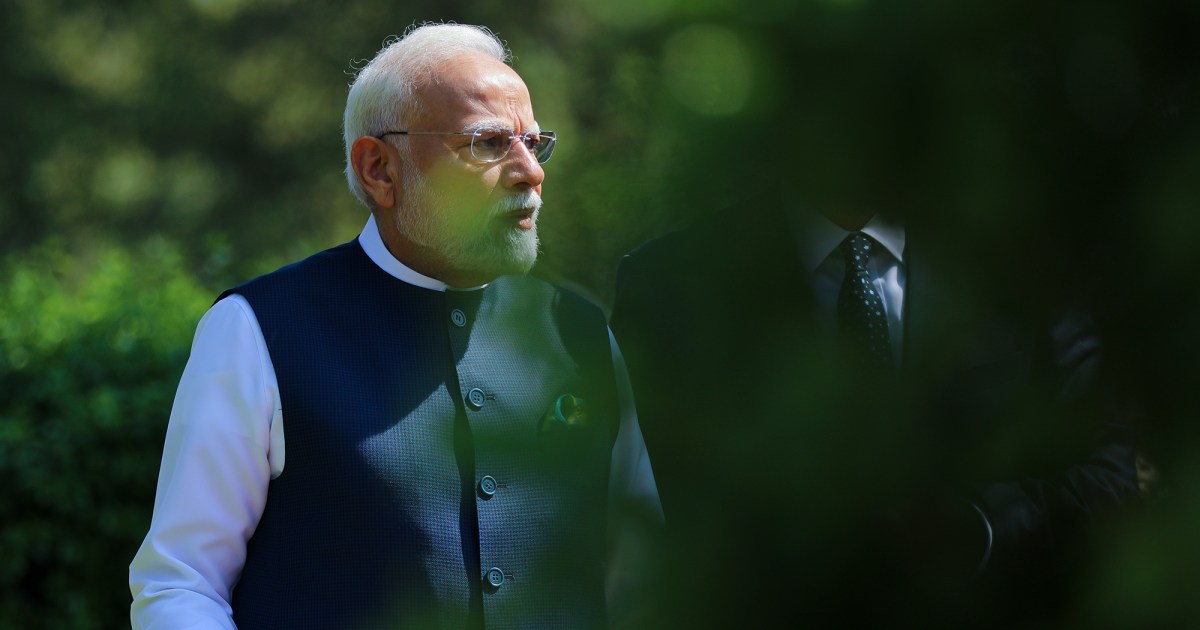In early June, a gurdwara in Fremont, California shared a potential bombshell document on X. Obtained through public records requests, the legal note implied that the Hindu American Foundation (HAF)—an advocacy group for the Hindu diaspora in the United States—maintains a “fiduciary” relationship with the Indian embassy in Washington, D.C.
It could have massive consequences: If HAF, one of the wealthiest and most controversial nonprofits to organize on behalf of American Hindus, is financed by the embassy, it could trigger a violation of the Foreign Agent Registration Act (FARA).
It is not illegal to operate as a “foreign agent” in the United States. But organizations must register. And with the filing comes a series of significant requirements. If HAF were to register as a foreign agent, it would be compelled to publicly disclose detailed information about any alleged dealings with the Indian government.
Ben Freeman, the Director of the Democratizing Foreign Policy program at the Quincy Institute, described the registration act as somewhat “murky” when it comes to dictating what think tanks or nonprofits can and cannot do. Still, establishing a “fiduciary relationship is really key for FARA.”
On its surface, HAF looks like a typical advocacy group. Created in 2003, it purports to provide school boards, law enforcement, college campuses, and journalists with “a better understanding and inclusion of Hindu Americans.” On an ideological level, many have said HAF is to India what the Anti-Defamation League is to Israel. The foundation—increasingly influential as the South Asian population increases in the US— operates aggressively to help shape a particular consensus on the most divisive political issues in the diaspora. HAF has publicly condemned caste abolitionists in California, Sikhs rallying for self-determination, and reporters who frame India’s military and human rights abuses in Kashmir as an occupation.
Any organization is free to support the policy of a foreign government, but the Department of Justice lays out several criteria that the government would use to establish a relationship between the “agent” and “foreign principal.” As outlined in a 2020 memo from the DOJ, “the purpose of FARA is not to restrict speech, but rather to identify it as the speech of a foreign principal (when fairly attributed), and thus to enable American audiences to consider the source in evaluating the message.” Finances can play a key part. “Frankly, the DOJ hasn’t done a good job of making it clear when think tanks should and shouldn’t register under FARA,” Freeman explained, “but there are a couple red lines that have been drawn.”
One of these criteria is somewhat objective: if the agent is receiving compensation for their activities. The other criteria are more subjective. If HAF were to be investigated by the DOJ, it would have to be established that the Indian government or embassy yields “some level of power by the principal over the agent.” The government would then consider if the foundation had an “ongoing relationship” with the foreign principal, whether their activities are “coordinated with the foreign principal,” whether their relationship is “documented in a written agreement,” or whether their actions are “a one-off or part of a pattern.”
The recent allegation of FARA violation began amid a flurry of paperwork. The Fremont Gurdwara Sahib requested email correspondences between the Indian Embassy in Washington and HAF, under India’s Right to Information Act (RTI). The embassy refused to release this information. But, it did so in an odd way. According to the documents provided to Mother Jones, the embassy replied to the gurdwara’s information request with a denial, and wrote that the disclosure of such emails would “irreparably breach” the trust between HAF and the embassy’s mission. They added that “some of the information” sought by the requesters contained “fiduciary” information that the embassy is entitled to withhold under Indian law.
Prabhjot Singh, a spokesperson for the temple, said they felt compelled to make the document request in response to HAF’s close coordination with Prime Minister Narendra Modi and American politicians. HAF has previously liaised directly with Modi, former governor of South Carolina Nikki Haley, and former Hawaiian Congresswoman and (one-time Democrat) Tulsi Gabbard when Modi visited the United States in 2014. HAF played a similar role during two more trips in 2019 and 2024. HAF also organized a briefing in 2019 between Capitol Hill staffers and the Indian Embassy to discuss Modi’s first term, for which they provided materials to participants that touch on religious violence in India, while making no mention of the significant role Hindu paramilitaries played in organized attacks on minorities. (Modi was previously banned from entering the US for his role in the 2002 anti-Muslim pogrom.)
The Department of Justice encourages citizens to report violations with the federal government if they suspect that a person or organization is acting as an authorized foreign agent. The gurdwara filed a complaint with the DOJ through their legal counsel Lex Politica, an Austin–based law firm that has previously represented Elon Musk. As reported by the Times, the founder of the firm, Chris Gober, hopes to develop Lex Politica as the outside counsel to major Republicans like House Speaker Mike Johnson.
In conjunction with the “fiduciary” connection, a term Singh is convinced implies a formal loyalty, the gurdwara’s legal counsel says HAF’s response shows an unambiguous violation of FARA. The complaint says that the foundation has “consistently and unequivocally advocated for the interests of [Modi’s Bharatiya Janata Party] on both domestic and foreign policy matters,” drawing on social media posts, interviews, newsletters, and other communications that indicate a close relationship between HAF and Indian politicians that span the last decade.
“Given its ‘fiduciary’ relationship with the Indian Embassy, [HAF] appears to be acting in alignment and in coordination with a foreign government,” said Singh. “It strikes at the heart of American sovereignty, civil rights, national security, all of those things are influenced by this.”
The legal complaint is similarly forceful. “A review of publicly-available information reveals that HAF appears to be acting as an agent of the Indian Embassy in Washington, D.C. and the Bharatiya Janata Party (‘BJP’), the ruling government of India,” Lex Politica wrote in their letter addressed to Attorney General Pam Bondi. “This consistent and repeated activity directly on behalf of its foreign principals demands that HAF register and report according to FARA’s requirements.”
The embassy has yet to elaborate on the details of said fiduciary connection. Neither HAF nor the Indian Embassy responded to comment on the exact nature of their relationship, financial or otherwise, but the foundation did tell The Guardian that they deny the claims and are open to meeting with the DOJ, Gabbard, and FBI Director Kash Patel to discuss the “dangerous accusations” against them.
HAF also responded to the allegations in a public statement, calling the complaint just the “latest dual loyalty smear” and said the foundation “categorically rejects the ludicrous allegation that HAF coordinates its activities with the Government of India.” Making no clear connection to the Fremont gurdwara, the statement also mentions Khalistan. The Khalistan movement aims to establish a sovereign Sikh state; for a significant number of American Sikhs, the movement represents a nonviolent freedom struggle; HAF says the movement is fundamentally anti-Hindu.
The Fremont gurdwara has been active in local Khalistan organizing for years, and in response, HAF has publicly disparaged their political stance in the press. Their statement on the FARA allegations goes on to suggest that HAF is being targeted for “their strong advocacy” against the Khalistan movement.
HAF is already infamous in some circles. It has reportedly orchestrated smear campaigns against scholars and organizations who ideologically oppose the rightwing elements in Indian politics, namely Modi’s Bharatiya Janata Party. Researchers have placed HAF within a larger network of other right-wing Hindu organizations, which have explicit connections to the Rashtriya Swayamsevak Sangh (RSS), a massive Hindu paramilitary organization in India. According to Jewish Currents, HAF has wielded the accusation of “hinduphobia” against anyone outwardly critical of hindutva, especially on college campuses.
And this is not the first time HAF has faced similar accusations of violating FARA. A 2024 report in Al Jazeera found that HAF appeared to be “treading a fine line” between acting as a nonprofit and a foreign agent, even if the organization denies that it operates on the direct behalf of the Indian government.
Whether a connection between the activities of HAF and the will of the BJP can be plausibly established, enforcement is an entirely separate issue. “I think it’s unlikely that Trump’s DOJ under Pam Bondi would do anything about it,” Freeman said.
Since 2023, the self-professed “largest democracy in the world” has made international headlines for its very undemocratic repression of its critics from afar. Canadian intelligence connected the Modi government to the murder of Khalistan activist and Canadian citizen Hardeep Singh Nijjar and the Justice Department announced its charges against an Indian intelligence employee who attempted to murder a Sikh lawyer and American citizen in 2023. These events prompted Sen. Adam B. Schiff (D-Calif.) to introduce the Transnational Repression Reporting Act, currently working its way through the House.















